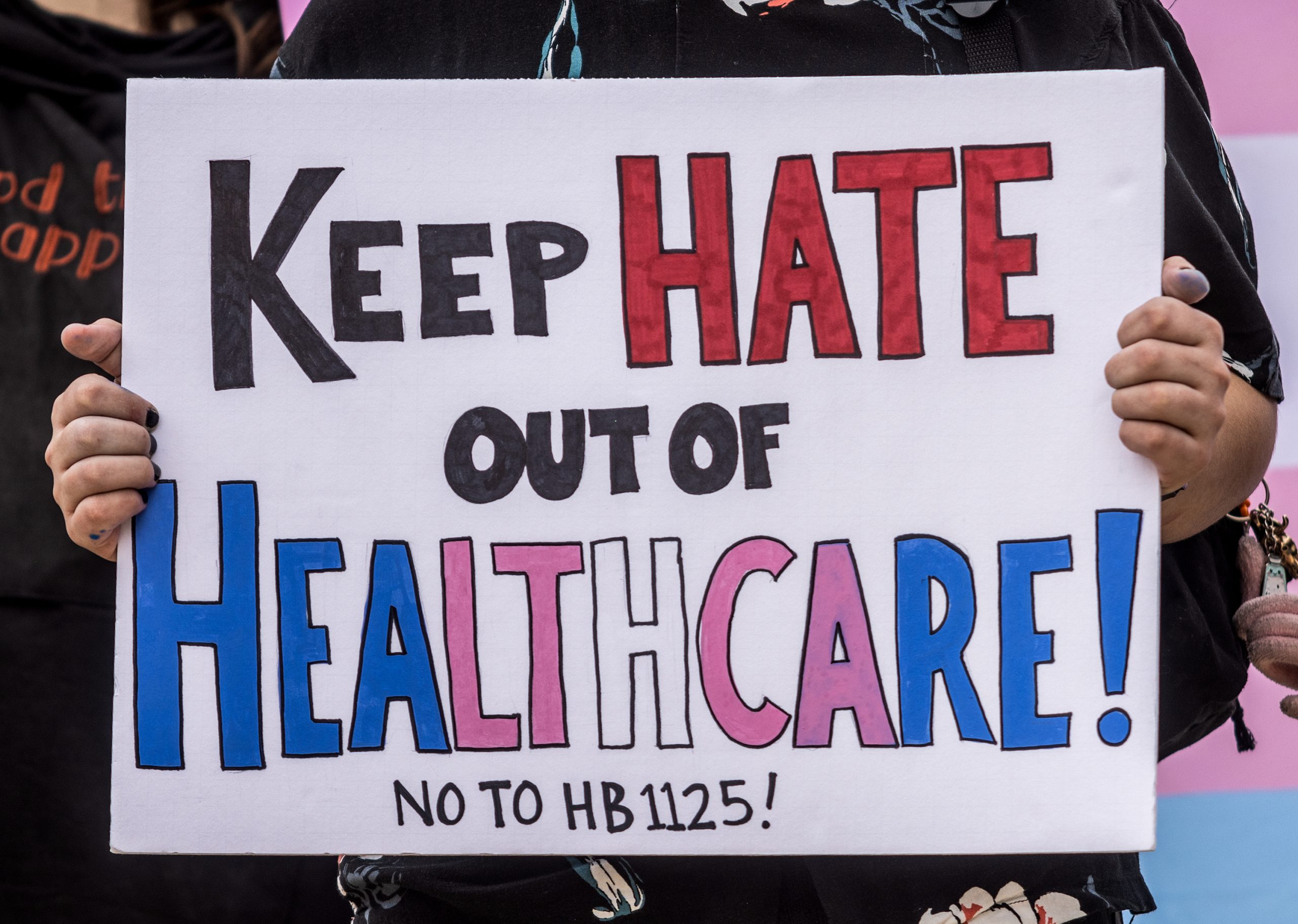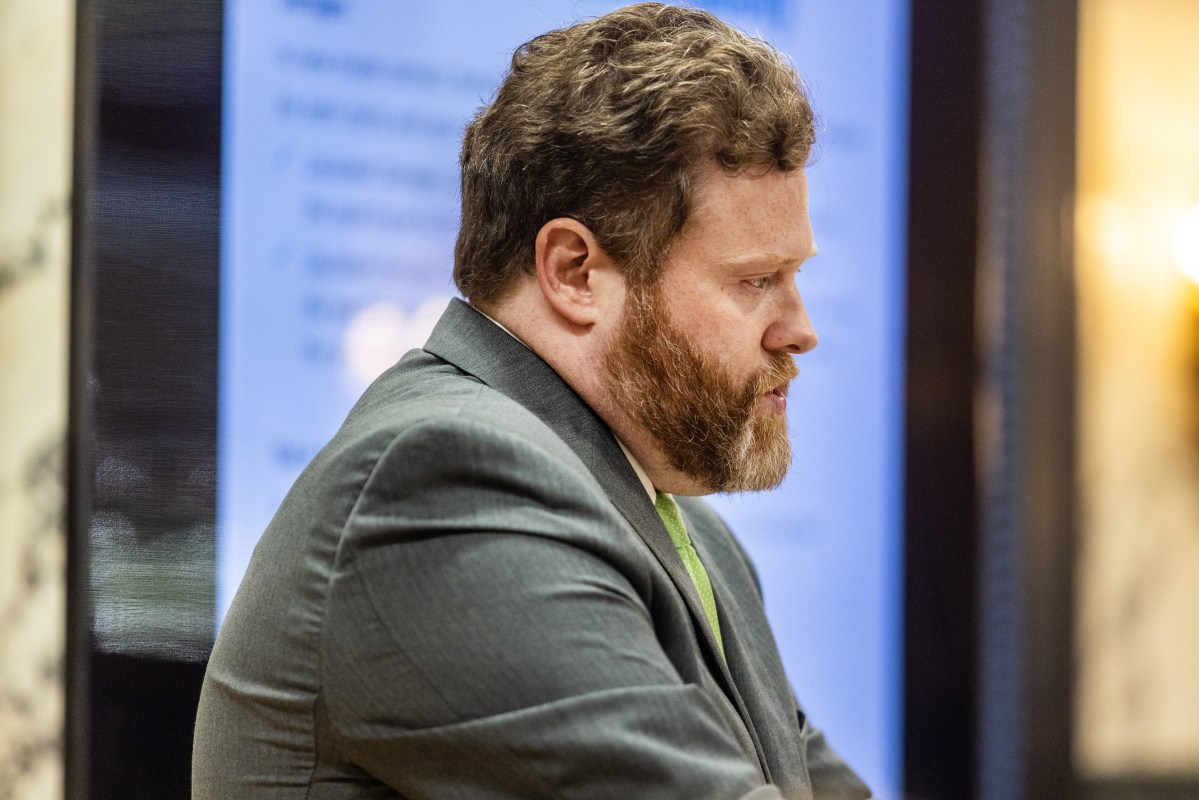Mississippi Today
Mississippi Medicaid: Gender-affirming care for kids is not ‘safe and effective’

Mississippi Medicaid: Gender-affirming care for kids is not ‘safe and effective'
The Mississippi Division of Medicaid is the first state agency to take a public position on gender affirming care to transgender children, stating there is not enough medical literature to support that it is a “safe and effective treatment for gender dysphoria.”
In a letter to managed care companies that contract with Medicaid, Executive Director Drew Snyder wrote that the agency concurs with its counterpart in Florida that there is not enough evidence that “sex reassignment through medical intervention” is safe. Florida's report was released in June of last year.
Snyder did not respond to a call and text to his personal cell phone Thursday afternoon. His letter was addressed to executives of Molina Healthcare of Mississippi, UnitedHealthCare Community & State MS and Magnolia Health Plan. Communications officials with the three companies did not immediately respond to requests for comment.
“As the care coordination organizations for the majority of children and adolescents enrolled in Mississippi Medicaid, your input is welcome on approaches to effectively address any health needs without posing risky side effects or irreversible changes,” he wrote.
It's unclear if Snyder's letter has any effect on what services are currently covered, or why he reached out to the managed care companies instead of providers of gender-affirming care. If the agency does opt to exclude this treatment, it would join a handful of states already doing so. Alaska, Arizona, Arkansas, Florida, Kentucky, Missouri, Nebraska, Ohio, Tennessee and Texas all have Medicaid policies that specifically exclude transgender health coverage, according to the Movement Advancement Project.
The Feb. 15 letter first reported by the Magnolia Tribune comes as a bill is working its way through the Legislature that would ban this kind of treatment for trans minors in Mississippi. House Bill 1125 would prevent the state's roughly 2,400 trans kids and their families from getting hormone therapy or puberty blockers in the state.
Snyder's letter contradicts the advice and position of major medical associations in the U.S. on gender-affirming care. It is evidence-based, and not considered “experimental” by the majority of the medical community.
Also known as the “Regulate Experimental Adolescent Procedures” (REAP) Act, the bill bans Mississippi doctors from performing gender-confirmation surgery or prescribing drugs such as puberty blockers or hormones to those under 18.
The bill would allow for the doctors' licenses to be revoked and create a “civil claim of action” for them to be sued with a 30-year statute of limitations. It would prohibit insurers or Medicaid from reimbursing families for such procedures and would strip doctors who provide them of the state's generous tort claims protections.
READ MORE: What to know about gender-affirming care in Mississippi
Gender-affirming care, or “sex reassignment” as Mississippi officials have called it, refers to a broad range of interventions, from medical treatment to psychological and social support, that aims to affirm an individual's gender identity, especially when it is different from the one they were assigned at birth, according to the World Health Organization.
Decades of research support gender-affirming care as the proper treatment for gender dysphoria, the distress trans people can experience when their physical features do not match their gender identity.
Research has repeatedly shown that gender-affirming care significantly boosts the chances that trans kids will live to see adulthood. A study published last year in the peer-reviewed Journal of the American Medical Association found that over the course of a year, gender-affirming care was associated with 60% reduced odds of moderate to severe depression and 73% less odds of suicidal thoughts.
Stacie Pace, the co-owner of Spectrum: The Other Clinic, said that the two main international medical organizations that write guidelines for gender-affirming care — the World Professional Association for Transgender Health and the Endocrine Society — cite hundreds of references and are easy to find on the internet.
“All it takes is just a quick Google, and all this research is right there in front of you,” she said.
There are three main forms of gender-affirming medical treatment: Puberty blockers, which are only for kids, hormone therapy and gender-confirmation surgery. In Mississippi, there is no clinic that performs any kind of gender-confirmation surgery on minors, according to in-state providers of gender-affirming care.
Puberty blockers are medications that pause puberty in kids. Research has shown the effects are reversible. While hormone therapy can cause some permanent effects, such as a deeper voice, it typically takes at least a year for this to occur, Pace said.
But Pace added that many other side effects of hormone therapy, like increased muscle mass or the development of breast tissue, will disappear over time if a patient ceases treatment.
“It will take about as long as it took for it to occur, but it will go away,” she said.
Alex Mills, a pharmacist who has worked with trans people, said he was confused by the letter. While a minority of his patients are on Medicaid, he hasn't heard of Medicaid covering prescriptions for hormone therapy for trans adults since he started working in Jackson three years ago. If Medicaid covered prescriptions for his outspoken patients, Mills said they would tell him.
“I feel like they're just kind of jumping on the bandwagon,” he said. “It's an irrelevant comment, because they (Medicaid) haven't been covering (hormone therapy), so I'm just confused why they're even saying this. Just to say it?”
Mills said Medicaid has covered medical visits, but that he doesn't know if it has covered puberty blockers, which can be pricey – up to $1,500 for a single shot that lasts a month. Hormone therapy is cheaper, so Mills recommends patients use GoodRx coupons to make their prescriptions more affordable.
At Spectrum, Pace said just one youth patient is currently on Medicaid. But of the clinic's roughly 1,000 adult patients, about half are Medicaid beneficiaries.
The Division of Medicaid has not taken a stance on other issues being considered by the Legislature. One of those is extending postpartum care from 60 days to one year for new mothers, which Speaker of the House Philip Gunn said he has asked the agency to do.
When a committee tasked with advising Medicaid about health and medical care services voted unanimously in October to recommend that the Legislature extend postpartum coverage, the Division of Medicaid still did not take a stance.
The State Board of Medical Licensure, which would enforce the bill's provision revoking providers' licenses, has not responded to questions from Mississippi Today. The University of Mississippi Medical Center, which has provided gender-affirming care to trans kids at its LGBTQ-focused TEAM Clinic, said earlier this month that “we have no comment for now.”
This article first appeared on Mississippi Today and is republished here under a Creative Commons license.
Did you miss our previous article…
https://www.biloxinewsevents.com/?p=209008
Mississippi Today
On this day in 1917
May 5, 1917

Eugene Jacques Bullard became the first Black American combat pilot.
After the near lynching of his father and hearing that Great Britain lacked such racism, the 12-year-old Georgia native stowed away on a ship headed for Scotland. From there, he moved to Liverpool, England, where he handled odd jobs before becoming a boxer, traveling across Europe before he settled in Paris.
“It seems to me that the French democracy influenced the minds of both White and Black Americans there and helped us all to act like brothers as near as possible,” he said. “It convinced me, too, that God really did create all men equal, and it was easy to live that way.”
When World War I began, he was too young to fight for his adopted country, so he and other American expatriates joined the French Foreign Legion. Through a series of battles, he was wounded, and doctors believed he would never walk again.
No longer able to serve in the infantry, an American friend bet him $2,000 that he could not get into aviation. Taking on the challenge, he earned his “wings” and began fighting for the French Aéronautique Militaire.
He addressed racism with words on his plane, “All Blood Runs Red,” and he nicknamed himself, “The Black Swallow of Death.”
On his flights, he reportedly took along a Rhesus monkey named “Jimmy.” He tried to join the U.S. Air Service, only to be turned away because he was Black. He became one of France's most decorated war heroes, earning the French Legion of Honor.
After the war he bought a Paris nightclub, where Josephine Baker and Louis Armstrong performed and eventually helped French officials ferret out Nazi sympathizers. After World War II ended, he moved to Harlem, but his widespread fame never followed him back to the U.S.
In 1960, when French President Charles de Gaulle visited, he told government officials that he wanted to see his old friend, Bullard. No one in the government knew where Bullard was, and the FBI finally found him in an unexpected place — working as an elevator operator at the Rockefeller Center in New York City.
After de Gaulle's visit, he appeared on “The Today Show,” which was shot in the same building where he worked.
Upon his death from cancer in 1961, he was buried with honors in the French War Veterans' section of the Flushing Cemetery in Queens, New York.
A sculpture of Bullard can be viewed in the Smithsonian National Space and Air Museum in Washington, D.C., a statue of him can be found outside the Museum of Aviation, and an exhibit on him can be seen inside the National Museum of the U.S. Air Force, which posthumously gave him the rank of a second lieutenant. He is loosely portrayed in the 2006 film, “Flyboys.”
This article first appeared on Mississippi Today and is republished here under a Creative Commons license.
Mississippi Today
A seat at table for Democrats might have gotten Medicaid expansion across the finish line
The Mississippi Capitol is 171,000 square feet, granted a massive structure, but when it comes to communication between the two legislative chambers that occupy the building, it might as well be as big as the cosmos.
Such was the case in recent days during the intense and often combustible process that eventually led to the death of Medicaid expansion and with that the loss of the opportunity to provide health care for 200,000 working poor Mississippians with the federal government paying the bulk of the cost.
Democrats in the state House came under intense pressure and criticism for blocking a Medicaid expansion compromise reached by Republican House and Senate negotiators.
First of all, it would be disingenuous to argue that Democrats, who compose less than one-third of the membership of either chamber, blocked any proposal. Truth be known, Republicans should be able to pass anything they want without a solitary Democratic vote.
But on this particular issue, the Republican legislative leadership who finally decided that Medicaid expansion would be good for the state needed the votes of the minority party, which incidentally had been working for 10 years to pass Medicaid expansion. The reason their votes were needed is that many Republicans, despite the wishes of their leaders, still oppose Medicaid expansion.
The breakdown in the process could be attributed to the decision of the two presiding officers, House Speaker Jason White and Lt. Gov. Delbert Hosemann in the Senate, not to appoint a single Democrat to the all-important conference committee.
Conference committees are formed of three senators and three House members who work out the differences between the two chambers on a bill. Considering that Democratic votes were needed in both chambers to pass Medicaid expansion, and considering Democrats had been working on the issue for a decade while Republicans blocked it, it would have made sense that they had a seat at the table in the final negotiations process.
One Democrat from each chamber on the conference committee could not have altered the outcome of the negotiations. But the two Democrats could have provided input on what their fellow legislative Democrats would accept and vote for.
In the eyes of the Democrats, the compromise reached without their voice being heard was unworkable and would not have resulted in Medicaid expansion.
The Republican compromise said Medicaid would not be expanded until the federal government provided a waiver mandating those on Medicaid expansion were working. Similar work requirement requests by other states have been denied. Under the compromise, if the work requirement was rejected by federal officials, Medicaid expansion would not occur in Mississippi.
After voicing strong objections to the work requirement, House Minority Leader Rep. Robert Johnson, recognizing the Senate would not budge from the work requirement, offered a compromise. The Johnson compromise to the compromise was to remove a provision mandating the state apply annually with federal officials for the work requirement.
Instead, under Johnson's proposal, state Medicaid officials would be mandated to apply just once for the work requirement. If it was rejected, Medicaid expansion would not occur, but hopefully that would compel the Legislature to take up the issue of the work requirement and perhaps remove it.
“We just want the Legislature to come back and have a conversation next year if the federal government doesn't approve the work requirement. It's as simple as that,” Johnson said.
Senate leaders agreed that Johnson's proposal was a simple ask and something they might consider.
But Lt. Gov. Delbert Hosemann, who presides over the Senate, said he never heard Johnson's proposal until late in the process — too late in the process, as it turned out.
Speaker Jason White, R-West, also said he never heard the proposal, though Johnson said he repeatedly discussed it with House leaders. He certainly was relaying the information to the media during the final hectic days before Medicaid expansion died.
And perhaps if Johnson or one of his Democratic colleagues had been on the conference committee, that information would have been heard by the right legislative people and perhaps Medicaid expansion would not have died.
After all, a conference room or an office where negotiators are meeting to hammer out a compromise is much smaller than the massive state Capitol, where communications often get lost in the cosmos.
This article first appeared on Mississippi Today and is republished here under a Creative Commons license.
Mississippi Today
On this day in 1884


May 4, 1884

Crusading journalist Ida B. Wells, an African-American native of Holly Springs, Mississippi, was riding a train from Memphis to Woodstock, Tennessee, where she worked as a teacher, when a white railroad conductor ordered her to move to another car. She refused.
When the conductor grabbed her by the arm, “I fastened my teeth in the back of his hand,” she wrote.
The conductor got help from others, who dragged her off the train.
In response, she sued the railroad, saying the company forced Black Americans to ride in “separate but unequal” coaches. A local judge agreed, awarding her $500 in damages.
But the Tennessee Supreme Court reversed that ruling three years later. The decision upended her belief in the court system.
“I have firmly believed all along that the law was on our side and would, when we appealed it, give us justice,” she said. “I feel shorn of that belief and utterly discouraged, and just now, if it were possible, would gather my race in my arms and fly away with them.”
Wells knew about caring for others. At age 16, she raised her younger siblings after her parents and a brother died in a yellow fever epidemic. She became a teacher to support her family.
This article first appeared on Mississippi Today and is republished here under a Creative Commons license.
Did you miss our previous article…
https://www.biloxinewsevents.com/?p=355325
-
SuperTalk FM3 days ago
Driver’s education set to become mandatory in Mississippi as bill passes
-
SuperTalk FM6 days ago
Festival merger in Leland sets up one major event for Mississippi Delta
-
SuperTalk FM2 days ago
State approves $160M to expand Highway 7 to four lanes in Lafayette County
-
Mississippi Business4 days ago
Geartek expanding operations in Alcorn County
-
SuperTalk FM6 days ago
PERS bill set to phase in employer rate increase heads to governor’s desk
-
Mississippi News5 days ago
Two women accused of shoplifting across southeast captured in Mississippi
-
Mississippi News3 days ago
Altercation at Mississippi police department leads to officer-involved shooting
-
Mississippi Today6 days ago
Podcast: The contentious final days of the 2024 legislative session










![HIGH SCHOOL BASEBALL: Vancleave @ East Central (5/4/2024) [5A Playoffs, Second Round]](https://www.biloxinewsevents.com/wp-content/uploads/2024/05/1714933788_maxresdefault-400x240.jpg)
![HIGH SCHOOL BASEBALL: Vancleave @ East Central (5/4/2024) [5A Playoffs, Second Round]](https://www.biloxinewsevents.com/wp-content/uploads/2024/05/1714933788_maxresdefault-80x80.jpg)
![HIGH SCHOOL BASEBALL: George County vs. West Jones (MHSAA Playoffs) [05/03/24]](https://www.biloxinewsevents.com/wp-content/uploads/2024/05/1714928237_maxresdefault-400x240.jpg)
![HIGH SCHOOL BASEBALL: George County vs. West Jones (MHSAA Playoffs) [05/03/24]](https://www.biloxinewsevents.com/wp-content/uploads/2024/05/1714928237_maxresdefault-80x80.jpg)
![HIGH SCHOOL BASEBALL: East Central @ Vancleave (5/3/2024) [5A Playoffs, Second Round]](https://www.biloxinewsevents.com/wp-content/uploads/2024/05/1714935642_maxresdefault-400x240.jpg)
![HIGH SCHOOL BASEBALL: East Central @ Vancleave (5/3/2024) [5A Playoffs, Second Round]](https://www.biloxinewsevents.com/wp-content/uploads/2024/05/1714935642_maxresdefault-80x80.jpg)























